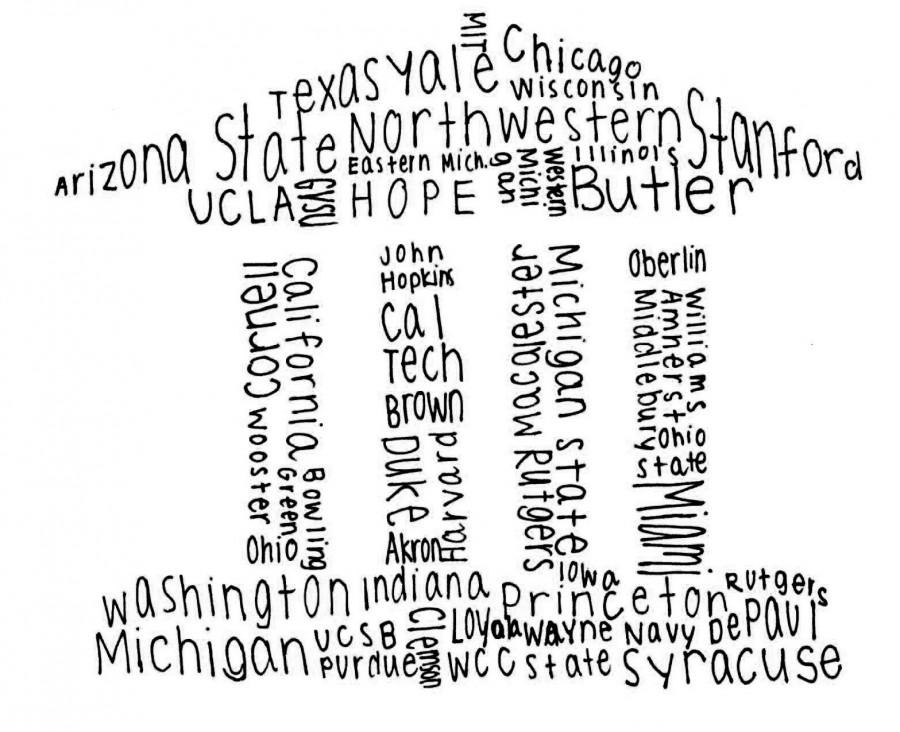Where to Go
When it comes to choosing the right college, only the individual can make the right choice.
It doesn’t matter. It does. And it doesn’t again. Each Google link explored offers different words of advice and facts. To some the answer is simple, and to others the question creates a silence as they mull it over. When asked as she sat on the first floor of CHS, junior Annie Noffke laughed; as Brian Williams opened the laptop in his office, he nodded. Both answered in their own and different way, because there ultimately is no direct answer to the question; does it matter where a student goes to college?
There are two ways to interpret this question. As Williams, one of two school counselors, first viewed it, his answer was in terms of fit and personality. He knows it is crucial to figure out which college a student can excel at the most.
“You want it to have the right programs,” he said. “You want to feel good as a part of the community, and it’s got to be affordable.”
From past experience, he sees students who wind up making the wrong decision, causing them to have a less fulfilling college career. Many students fear this will happen when they are not accepted into their first choices. Class of 2011 graduate Sonya Kotov found herself in a common situation when she did not get accepted into her first, second or third choice, and it prevented her from making the most of her first year at the University of Michigan.
“I’m not sure how it is now at CHS, but when I was a senior, I got the sense that large schools were impersonal and unfulfilling,” Kotov said. “That being said, Michigan ended up being an amazing fit — I honestly can’t imagine a school that would have better allowed me to pursue my passions.”
Although Kotov had little hope in succeeding at Michigan, she now understands attending a large school was vital to finding her place as “one tiny individual in a sea of hundreds,” and accepting the reality of the real world. The size of the university, overwhelming at first, has allowed her to pursue passions for computer science courses, co-op living and radical feminist activism.
Williams stresses the importance of finding a college that will match a student’s personality, as Kotov has now done. He believes that college is not only about the growth of knowledge, but also about communicating relationships and building an identity.
“If you’re going to spend at least four years somewhere, it’s really going to impact your identity as a person,” Williams said. “I think it’s pretty crucial to find the right school for you, [one] that’s a good fit.”
The other way to interpret the question, as Noffke did, was to compare outcomes of going to a prestigious university versus a smaller, lesser known school.
“If two people are applying to the same job, and they have all the same references except one of them got into Yale and one of them went to [Washtenaw Community College], they’re going to hire the person from Yale,” she said. “They can have the exact same GPA, they can have the same IQ, they can be the same person and just the fact that they got into a better college will heavily influence them in job opportunities.”
Noffke’s belief that specific jobs will require higher degrees is not uncommon. According to the Washington Post, it does not matter where a student goes to college in most cases, but can affect specific opportunities, like jobs, when it comes to a situation such as Noffke described. She believes it ultimately depends on what profession the student will be pursuing, and if it is a self-employed position or a competitive job.
Time Inc. reports the importance is in the fact that the student attends college, saying, “It doesn’t matter where you go to college, it just matters that you go.” This information is backed up by a study released in 2011 that found the earnings of two groups of college graduates varied little after 20 years. The study covered 19,000 alumni and showed that whether a student went to Williams College or Miami University of Ohio, the job results were very similar. Furthermore, in 2004, American author Gregg Easterbrook interviewed college officials and found that the attendance of an esteemed college had little impact on job satisfaction. Easterbrook’s study was done over ten years ago however, and ten years can change the course of a student’s application process greatly. This connects back to the idea of finding a school that fits the student’s personality because, as Jeffrey J. Selingo wrote for the Washington Post, it does matter where a student goes to college because the real value is actually graduating. Therefore students must choose a college they can earn a degree from.
In an article published by the Atlantic, the author leaves the reader with the ultimate message: “don’t be the person who was accepted into Princeton but act like one who could have been.” Princeton is just an example and can be replaced with any elite college. While this message matches that of Time’s, it is not the only solution on the web. A simple Google search of the question brings up thousands of results with different answers and opinions.
“I think there’s a certain drumbeat of our culture that artificially makes that matter, when in many cases it does not,” said Jerome Dueweke, Associate Director of Admission at Butler University in Indianapolis. “For students, the notion that one has to attend the highly ‘ranked’ college is unfortunate. That ranking or reputation means nothing if a student is not happy, supported, challenged [or] inspired in that environment.”
Williams spoke to this side of the question with thoughts similar to those of Noffke and Dueweke: the decision should be individually-based.
“We get a lot of students here that are Harvard [bound], or that level, or Brown, or something like that,” Williams said. “They’re going to flourish there. But that doesn’t work for a lot of our kids here. Smaller doesn’t necessarily mean easy. There’s very rigorous small schools, too, so I think that really depends on the individual.”
There is also, naturally, more pressure in some cities than others when it comes to the college decision making process. Particularly in Ann Arbor, many seniors and juniors can attest to the pressure of this decision, be it from their parents, peers or even the community in general.
“Especially at Community, we hear a lot of times that grades shouldn’t matter and it should be all about whether or not you know the material,” Noffke said. “In theory I think that’s true and that’s what we should aim for, but I think in this society the pressure is to get into a good college. I think that grades do matter, which is frustrating, because I definitely would like to just focus on learning the material, but instead you have to worry about all the tests.”
While Noffke raises yet another relevant topic, Williams offers the idea that one of the reasons Community students feel the pressure is because the University of Michigan is located in Ann Arbor.
“U of M is a great school but it’s not the school for everybody,” Williams said. “We get a lot of kids that go there and do great, but I would say there’s probably a little more pressure here as opposed to some of our surrounding communities, Dexter and Chelsea, where they’re not constantly being bombarded with the big block M.”
To some schools, geographic diversity is just as important as ethnicity, race and gender. As Mark Montgomery wrote in an article on greatcollegeadvice.com, students will have a higher chance of getting accepted if the school does not enroll many students from the state of which they are applying. This is not always the case, though. Of the 2015 graduating class from Community, for example, 18 percent of the students surveyed went to the University of Michigan, and 55 percent stayed within state. 107 of the 118 students participated in the survey. So as Montgomery writes, it may be helpful for seniors to research the demographics of a college they are applying to in order to see their chances of getting accepted, but it should not be the sole determinant in the college-application process.
The ultimate decision will come down to each individual senior, and they will decide with their own ranked priorities how important attending a prestigious school may be. Some consider the question as freshmen, others as upperclassmen. But be it their future, their personality, the location of the school, or another deciding factor, they are the only ones who can truly answer this question in the end.
“It can’t just be any college,” Williams said. “It has to be the right college for you.”









